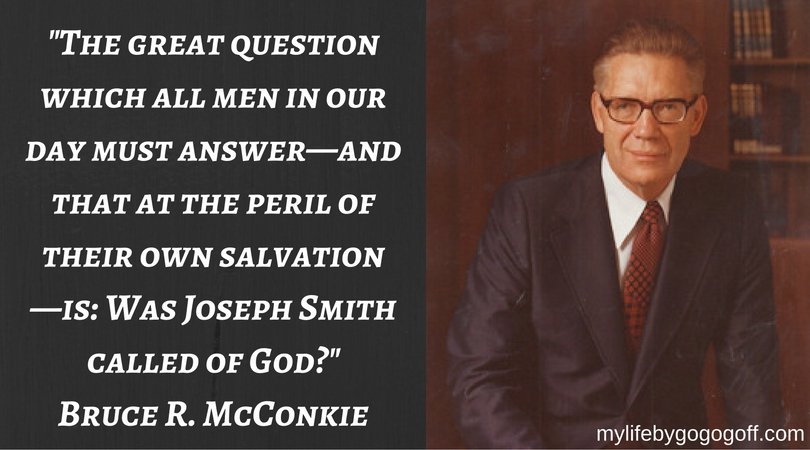Finding Truth: Response to “8 Anti-Mormon Tactics That Satan Uses To Attack The Latter-day Saints”
In March of 2017, MyLifeByGogoGoff published a piece entitled 8 Anti-Mormon Tactics That Satan Uses To Attack The Latter-day Saints. The piece was then reblogged by LDS Living.
I am certainly no expert logician, but I have taken a couple philosophy courses, and I spent many years in the sciences attempting to avoid committing the logical fallacies the author discusses. I offer brief reflection on and some counterpoint to these 8 points.
1. Half truths
I agree wholeheartedly that we should avoid believing in half-truths and lies.
I also agree that much literature critical of the LDS Church is not nearly careful enough in how it represents the data, and it often fails to present alternative interpretations. The same can also be said for much pro-LDS literature and scholarship. In general, when people engage in debate/dialogue over highly emotional and polarizing topics people tend to be especially biased in how they present their arguments (see, for example, this discussion on the polarization of Christian pro-cult/anti-cult scholarship).
While acknowledging that much anti-LDS literature engages in half-truths, LDS leaders themselves have also engaged in misleading and half-truths on various occasions.1
Church leaders appeared to engage in telling half-truths when they felt it was for a higher cause. Critics of the Church sometimes do the same thing in their haste to point out problems with the Church. I think we can all agree that nothing less than all the facts—presented honestly, carefully, and as un-biasedly as possible—is the standard both pro and anti LDS advocates should work to achieve.
Nobody is bound to accept a half-truth.
2. Irrelevant Appeals.
When someone testifies that the Book of Mormon is true, Satan will say “But Joseph used a seer stone in a hat!” And? What does that have to do with [whether] or not it is true? It is an irrelevant appeal. It is a distraction.
I agree that it is not the most important issue, but it is not irrelevant. For one, it is easier to view the Book of Mormon as an extension of Joseph’s treasure digging activities when we find that he used the same seer stone to translate the plates as he did to search for buried treasure years before. In addition, the instrument Joseph claimed to have used is important because he appears to be telling a different story at different times. For example, Joseph inserted the phrase “by the means of the Urim and Thummim” into Doctrine & Covenants 10:1, where it previously did not exist in the revelation as it was originally given (see the 1833 Book of Commandments chapter IX).
So his use of the seer stone is relevant to the translation of the Book of Mormon because it may point to a pattern of motivation and is central to evaluating the consistency of his message over time.
“The Church is true.” “But Brigham Young said…” Once again, saying something that is true, but irrelevant, detracts from the truth and is a lie.
One of the (few) ways we can determine that something is not true (at least in logical systems) is if it includes a logical contradiction. If Brigham Young said or did things that are genuinely irreconcilable with past or present leaders, then that is very relevant to those trying to evaluate whether the Church is true.2
Never let something distract you from your own testimony!
What if the evidence strongly suggests you ought to reconsider your testimony? For instance, imagine if you tried to provide evidence to a member of the FLDS group that Warren Jeffs was not a prophet or they shouldn’t be practicing polygamy and they refused to consider your arguments by responding: “I should never let something distract me from my own testimony!”
3. Argumentum ad hominem (personal attacks)
Joseph Smith is a Prophet of God.” Then Satan or someone believing his anti, replies “But Joseph Smith did X, Y or Z!” Instead of addressing the question, “Is he or is he not a prophet?”
How does one go about determining if a person is a Prophet of God (or if prophets of God even exist)? I can think of various tests, but the most famous test of all was provided by Jesus himself:
15 Beware of false prophets, which come to you in sheep’s clothing, but inwardly they are ravening wolves.
16 Ye shall know them by their fruits. Do men gather grapes of thorns, or figs of thistles?
17 Even so every good tree bringeth forth good fruit; but a corrupt tree bringeth forth evil fruit.
18 A good tree cannot bring forth evil fruit, neither can a corrupt tree bring forth good fruit.
19 Every tree that bringeth not forth good fruit is hewn down, and cast into the fire.
20 Wherefore by their fruits ye shall know them.
Generally, an ad hominem argument is considered a logical fallacy when the discussion about the person is unrelated to a discussion about the topic. However, discussion about Joseph Smith’s character and actions is highly relevant to a discussion of the topic of whether or not he was a genuine prophet of God, so it’s not necessarily a logical fallacy.
4. Argumentum Ad Lapidem (Appeals to the Stone)
I agree that some claims critical of the LDS Church sometimes fail to provide justification for why the absurd is also unlikely or untrue.
5. Argumentum Ad Verecundiam (Appeals to Authority)
Wikipedia defines Argument from Authority like this:
An argument from authority (Latin: argumentum ad verecundiam), also called an appeal to authority, is a common type of argument which can be fallacious, such as when an authority is cited on a topic outside their area of expertise or when the authority cited is not a true expert.[1] On the other hand, a “true expert” can have valuable insight.
M. Russell Ballard himself recently made just such an appeal to qualified academic authority:
…if necessary, we should ask those with appropriate academic training, experience, and expertise for help.
This is exactly what I do when I need an answer to my own questions that I cannot answer myself. I seek help from my Brethren in the Quorum of the Twelve and from others with expertise in fields of Church history and doctrine.
So, appeals to genuine experts within their field of expertise can be at least part of a solid logical argument.
But leading Egyptologists have proven that the papyri translation and the Book of Abraham don’t match up!”
Scholars are not 100% certain that the papyri we have is the papyri that Joseph Smith used to translate the Book of Abraham from. However, most of the evidence points to the Book of Abraham having been “translated” from the fragments that still exist.
Regardless, Joseph Smith points to specific characters on the facsimiles and gives a translation of those characters. So, even though there is some (slight) uncertainty about what characters Joseph was translating in order to produce the book of Abraham, and there is some discussion still about the ultimate meaning of the vignettes (for example), there is no question about the characters in the facsimiles because they were preserved in the sketches of the facsimiles themselves! Devout BYU Egyptologists have looked at those same characters and translated them. The translations do not match up. That is a statement of fact. We can discuss what that means (as the lds.org essay does), but we cannot escape the fact that, as the lds.org essay says, “Mormon and non-Mormon Egyptologists agree that the characters on the fragments do not match the translation given in the book of Abraham”.
When someone tries to appeal to the authority or knowledge of man rely upon the testimony of the Deity!
If you have had a sit-down with the creator of the universe, then by all means, take their word on things. However, most of us rely on very imprecise spiritual impressions, and these spiritual impressions tend to confirm to us whatever position we already hold and want to believe.
For instance, a recent poll asked people to pray to ascertain God’s will on the subject of gay marriage. Of the 68% of the participants who believed that they were able to assess the will of God, every single person found that God agreed with their prior stance on same sex marriage—even though the stances were evenly divided and diametrically opposed among the collection of participants.
Spiritual confirmation tends to track our familiarity and comfort with a given topic. Consider, for instance, Marlin K. Jensen’s frank discussion during the “Swedish Rescue” of his daughter’s experience with not feeling the Spirit in the temple
Data like this call into question the reliability of the “pray-feel” method for determining objective truth (even if it is useful for personal reflection).
When we hear something “new” does it change the witness we already have from the Holy Ghost? NO! Nothing should ever trump what the Holy Ghost has told us!
A member of The True and Living Church of Jesus Christ and Saints of the Last Days received a testimony that their Church is true (a Church that practices polygamy and claims a different prophet at its head). Imagine trying to have a conversation with this individual and suggesting their spiritual feelings may not mean exactly what they originally thought (for instance, that Thomas S. Monson is the true prophet and not James Harmston and they shouldn’t be practicing polygamy). What if they were to respond as you did above, “Nothing should ever trump what the Holy Ghost has told me!”?
This entire discussion about the witness of the Holy Ghost hinges on whether the receipt of powerful, elevating emotions should be interpreted to mean that God is speaking to the individual. Members of different churches receive powerful witnesses of the truth of their Church (see here and here), suggesting spiritual feelings may not be as sure a guide to truth as we have been taught.3
6. False Dilemma
The author wisely urges us to avoid the false dilemma logical fallacy (humans commit this fallacy frequently). However, given that we apparently have many of the words of God recorded in scripture, it seems fair to point out (apparent) contradictions and suggest that these inconsistencies might indicate, at the very least, that both sets of words were not written by God (this assumes that God won’t contradict himself). If God says, “A equals B” and then goes on to say “A is not equal to B” then merely stating that “God’s ways are … infinitely superior [to man’s ways]” seems like a bit of a dodge. Even if his ways are infinitely superior, we don’t expect him to contradict himself.
The main problem with the argument “we cannot fully understand God, therefore nobody can point out a genuine contradiction in scripture or a belief system”, is that such logic can be used to defend any religious system of thought. Try telling a Catholic that they don’t have genuine apostolic authority (“Of course we do: God’s ways are not man’s ways!”) or a Jehovah’s Witness that they should question their beliefs because their second coming predictions went unfulfilled (“It’s difficult to understand, but God’s ways are not man’s ways”). Such a defense goes too far.
7. Argumentum Ad Populum (Appeals to the People)
I agree with the author, we shouldn’t just accept an argument because many people do. This principle applies equally to Mormons as to non-Mormons.
8. Hasty Generalizations
I agree with the author that we need to be careful of extrapolating from one or a few data points. I personally had a wonderful time as a member and cannot directly relate with many who did not.
We should also be careful of the reverse hasty generalization: I had a good experience in the Church, therefore everyone had a good experience in the Church. Perhaps some people earnestly living the LDS lifestyle and attending Church did not find it as rewarding as I did.
(9.) Conclusion
At the end of the day, the only way to detect and prevent Satan’s lies…
This appears to by a false dilemma fallacy.
At the end of the day, the only way to detect and prevent Satan’s lies are to gain a testimony from God Himself that this work is true.
This appears to be begging the question. The belief in a Satan who is lying to us is preconditioned on knowing that the Church worldview is true. If the Church worldview does not correspond with reality, then we need not concern ourselves with Satan or his lies (just the lies and half-truths spoken and written by humans which are plenty damaging enough).
doubt your doubts before you doubt your faith.
As mentioned above, this kind of statement (if accepted universally) would encourage a person to continue in whatever faith tradition they were born into, without regard for the legitimacy of the truth-claims of their religion. Imagine leaders of the Heaven’s Gate cult, for instance, telling their followers “doubt your doubts.” Such a statement would only serve to maintain a person’s prior faith position and doesn’t seem to be a great guide in the quest to determine truth (see Fix your faith crisis with this one weird trick!).
When someone gives you something that brings you darkness rather than light
We should seek for truth and goodness as Joseph Smith encouraged, “let it come from whence it may.” Humans are very prone, however, to dismiss data and arguments that contradict their worldview, so we should be careful to avoid rejecting truth merely because it makes us uncomfortable upon first exposure.
ask yourself who is presenting this argument? Don’t let the words of apostate members shake your faith.
This is an ad hominen against former members. The truth of what a former members speaks is (at least until someone presents good evidence this is not the case) independent of their membership status.
Apostates are not a trustworthy source!
This appears to be a hasty generalization. Why can’t apostates be a trustworthy source? And, if an apostate is biased against the Church, doesn’t it stand to reason that Church members are biased for the Church? Perhaps the truth lies somewhere in-between?
- Joseph Smith was sealed twice to the Partridge sisters to mislead Emma.
- Joseph Smith, at least two of his wives, and several Church leaders misled others about polygamy on multiple occasions.
- The 1890 Manifesto (aka Declaration 1) states, “We are not teaching polygamy or plural marriage, nor permitting any person to enter into its practice …”, when in fact plural marriages were being permitted and authorized by leaders and would be for another 14 years.
- When asked questions about the temple and the Strengthening Church Members Committee, both Jeffery R. Holland and Michael Purdy attempted to mislead John Sweeney.
- LDS leaders have misled or told half-truths on at least several occasions:↩
- For instance, according to FairMormon (on 2017-03-23), “Brigham claimed to have received these beliefs [doctrines related to Adam-God theory] by revelation, and, on at least three occasions, claimed that he learned it from Joseph Smith.” For those who reject the validity of the Adam-God theory, this seems like the kind of contradiction that may call into question the validity of the claim that Brigham is a genuine prophet of God.↩
- See Testimony, Spiritual Experiences, and Truth: A Careful Examination for my complete analysis of spiritual feelings.↩



